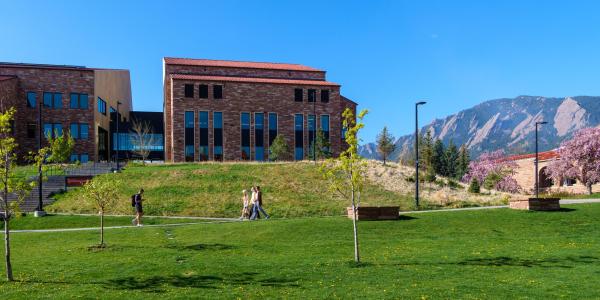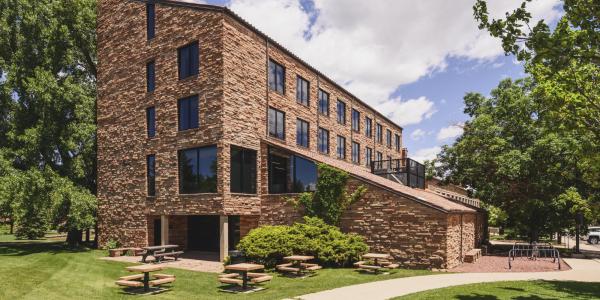The University of Colorado Board of Regents reviewed budget proposals—including tuition, fees and employee compensation plans—during its meeting April 7 at the CU Anschutz Medical Campus, along with results from Campus Culture Surveys, capital construction updates and a variety of other topics.
The board also briefly discussed the CU system president search following a public comment session, where six speakers expressed concern about a lack of Latino finalists. The selection committee has not publicly named any finalists but has indicated it will name one or more finalists in the coming weeks.
There will be a two-week period when the public can meet the individual(s) on campuses before the board votes publicly to elect a president. The board expects to make a final hiring decision on or before April 29.
Regent Chair Jack Kroll thanked the speakers for their input and expressed interest in continuing dialog with the Colorado Latino Leadership, Advocacy & Research Organization (CLLARO) and others on how to build partnerships between CU and the Latino community.
“The university wants to do more and needs to do more to meet the needs of your community,” Kroll said. “We must do more for our Latino students, staff and faculty.”
Approval of 2022–23 tuition, fees and compensation pool
The tuition and fee changes going into effect in fall 2022 will result in an overall 2.3% increase in combined tuition and mandatory fees for incoming undergraduate resident students.
Continuing resident undergraduate students will see a 1.6% decrease in combined tuition and mandatory fees, while continuing non-resident undergraduates will experience a 0.5% decrease in combined tuition and fees.
Graduate students will experience a 3% tuition increase.
The regents voted 8-1 on the tuition and fee proposals, with Regent Heidi Ganahl voting against.
Tuition and fees
CU Boulder’s four-year tuition guarantee ensures undergraduate students and families are not impacted by year-over-year tuition increases, so most of the tuition changes will apply only to graduate students and new, incoming undergraduates.
For tuition, the approved changes include:
- A tuition increase of 4.3% for the incoming fall 2022 cohort of undergraduate Colorado residents and continuation of the Four-Year Guarantee. When the elimination of the capital construction fee is factored in, this becomes an effective 2.3% tuition and fee increase.
- Undergraduate non-resident and graduate students will see a 3% tuition increase with two exceptions: tuition for the post-baccalaureate computer science program and the teacher leadership master’s program will remain flat.
- Implementation of tiered tuition—approved by the board of regents in June 2021—for incoming undergraduates, to go into effect in fall 2022, pending legislative approval. The current tuition structure for continuing students will not change, per the Four Year Guarantee.
For student fees, the approved changes include:
- Room and board rates will increase by 3% for next year.
- As part of the CU Strategic Plan, CU Boulder will eliminate the capital construction fee, saving students $100 per semester.
- The CUSG student activity fee will increase by $10, or 2.6%.
Employee compensation
Regents also approved a faculty and staff compensation pool, noting the importance of adjusting compensation over time to remain competitive in attracting and retaining faculty and staff. The resolution includes:
- A planned 3% across-the-board salary increase for classified staff.
- A planned 3% compensation pool for university staff and faculty to be awarded based on merit in January 2023.
Additional compensation-related initiatives that will be included in the fiscal year 2022–23 budget request in June are:
- An additional $3.1 million pool to address employee salary compression and retention.
- $1.2 million toward faculty tenure and promotion to help address market pressures, better alignment with peer universities, inflation and faculty retention.
- A 3% increase to graduate student assistant stipends, and for faculty adjuncts and lecturers.
Budget outlook
Based on current enrollment projections and anticipated tuition and fee plans, the campus plans in 2022–23 to invest in increased funding for financial aid; for schools, colleges and academic and administrative support units through a new budget model; for the Chancellor’s Diversity Initiative and technology infrastructure; and for faculty tenure and promotion.
Campus Culture Survey results
The regents also received updates about the culture and workplace surveys administered to students, staff and faculty on all four CU campuses last fall.
CU Boulder released the results of the 2021 Campus Culture Survey today via a new website that includes additional resources and information about how the campus will address inequities and other challenges identified through the survey.
During the board meeting, Senior Vice Chancellor for Diversity, Equity and Inclusion Sonia DeLuca Fernández shared preliminary survey results for students, faculty and staff and highlighted disparities related to sense of belonging, community and support by demographic groups.
She noted that the experiences of students, staff and faculty vary dramatically, depending on how people search through the survey results.
“In order to be inclusive, we have to have a better handle on the actual friction and tension points,” DeLuca Fernández said. “We have a long way to go when it comes to community-building.”
Preliminary findings
Nearly 18,000 CU Boulder community members participated in the survey, and response rates were strong, with 73% of staff, 59% of faculty, 48% of graduate students and 30% of undergraduate students responding to survey questions.
DeLuca Fernandez presented several examples showing how personal identities intersect to affect overall results.
According to preliminary survey results, 28% of faculty disagreed (i.e., strongly disagreed, disagreed or somewhat disagreed) with the statement, “I have a sense of community at CU.” When broken down further by U.S. racial group, faculty who disagreed with the statement included Middle Eastern or North African (23%); Asian or Asian American (24%); white (27%); Hispanic, Latino or Latinx (34%); American Indian or Alaska Native (39%); and Black or African American (50%).
Among staff members, 16% overall disagreed with the statement, “My work is valued by my department.” By demographic group, staff who disagreed with the statement included people who identify as women (16%) and people who identify as men (16%). Among staff respondents who identify as women, when broken down further by U.S. race and ethnicity, the results were: Asian and Asian American (9%); white (15%); Middle Eastern or North African (19%); Hispanic, Latino or Latinx (22%); American Indian or Alaskan Native (29%); and Black or African American (37%).
Survey results indicate that 23% of undergraduate students disagreed with the statement, “I have a sense of community at CU.” Among undergraduate students who are first-generation scholars, 29% disagreed. When broken down further by racial category, the results were: Asian or Asian American (23%); white (28%); Hispanic, Latino or Latinx (29%); Middle Eastern or North African (38%); Black or African American (39%); American Indian or Alaskan Native (46%); Native Hawaiian or Pacific Islander (50%).
Among graduate students, 22% of respondents disagreed with the statement, “I have a sense of community at CU.” Among graduate students with a disability, 32% disagreed. When broken down further by racial group, graduate students with a disability who disagreed were: Middle Eastern or North African (22%); Asian or Asian American (31%); white (31%); Hispanic, Latino or Latinx (38%); Black or African American (39%); and American or Alaskan Native (50%).
Action planning and next steps
This spring, academic and administrative planning units will begin developing action plans to improve programs and support services for students, staff and faculty with support from DeLuca Fernández’s office. Staff diversity, equity and inclusion (DEI) consultants will provide coaching and support, help identify work needed to advance the units’ goals, align the units’ efforts and synthesize CU Boulder’s efforts for advancing diversity, equity and inclusion.
Guiding their work will be the survey results, the five DEI goals inspired by the Inclusion, Diversity and Excellence in Academics (IDEA) Plan, the campus’s strategic priorities, Buff Undergraduate Success and other campus efforts.
The regents also discussed how frequently the university should administer the survey and approved a resolution requesting that the system administration and four CU campuses administer the survey every four years, while also allowing for microsurveying in areas of focus between the four-year periods.
Capital construction updates
As part of the consent agenda, the board of regents approved updated program plans for a pair of capital construction projects that address major renovation and renewal of the Guggenheim Geography and Macky Auditorium buildings.
The regent approvals are conditional on the receipt of state legislative appropriations next spring for the 2023-24 fiscal year that would cover a portion of each project.
Program plans for projects seeking state funding are updated and approved by the regents every three years, with the program plans for Macky and Guggenheim last being approved by the regents in 2019.
The Guggenheim and Macky requests include:
- A $67.7 million renovation of Macky to address deferred maintenance and building renewals. CU Boulder funded programmatic improvements: $40.6 million. State capital construction funds for capital renewal: $27.1 million.
- A $42 million renovation of Guggenheim to address deferred maintenance and programmatic upgrades. CU Boulder funded programmatic improvements: $25.2 million. State capital construction funds for capital renewal: $16.8 million.
Separate from the state-funded requests, the regents also approved a budget amendment to the previously approved program plan for a new specialized cleanroom space supporting the Colorado Shared Instrumentation in Nanofabrication and Characterization (COSINC) Laboratory. The $8.5 million space is under construction at the Sustainability, Energy and Environment Laboratory (SEEL) building, with occupancy slated for early 2023.
Other business
The board also:
- Approved a project to move toward a single, systemwide timekeeping software, PeopleSoft, for all employees in an effort to consolidate more than 20 disparate systems currently in use. The $6.9 million project will roll out in two phases, with CU Boulder and the system office starting in spring 2023 and the Denver, Anschutz and UCCS campuses starting in fall 2023.
- Discussed the first pillar of the CU Strategic Plan, which focuses on affordability and student success. The board received information about national mental health and wellness trends (PDF), along with steps being taken on each campus to address the issue.
- Approved sabbaticals for 48 CU Boulder faculty members and one tenure appointment.
- Approved new contracts for football assistant coaches Rod Chance (cornerbacks) and Gerald Chatman (defensive line). Both contracts run through Feb. 14, 2024.
- Approved a resolution recognizing April as Sexual Assault Awareness Month. CU Boulder Tri-Executive Kavya Kannan spoke during public comment in support of the resolution and the importance of the topic.
- Recognized Professor Ruth Ellen Kocher of the Department of English as a University of Colorado Distinguished Professor, along with five faculty members from other campuses.
The next regular board meeting is scheduled for June 23–24 at CU Boulder.



